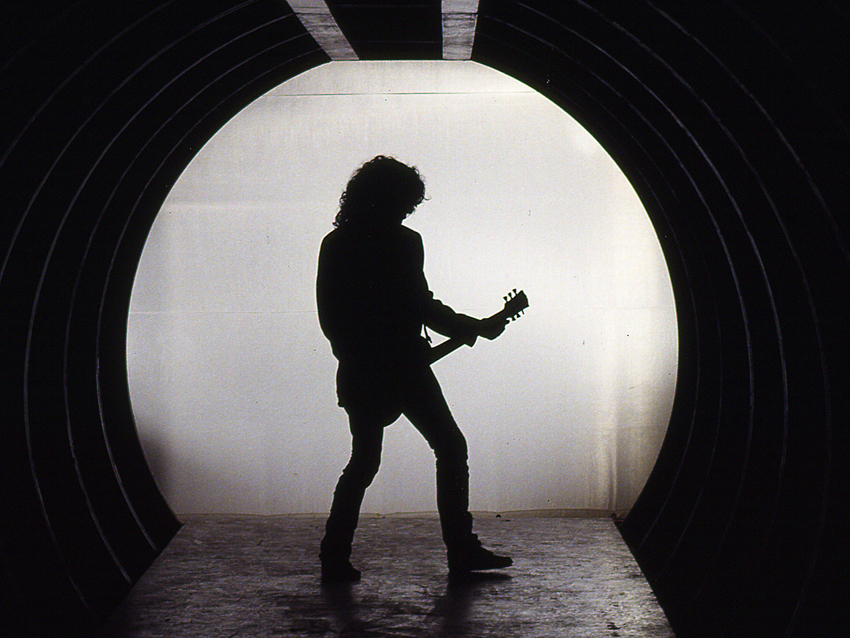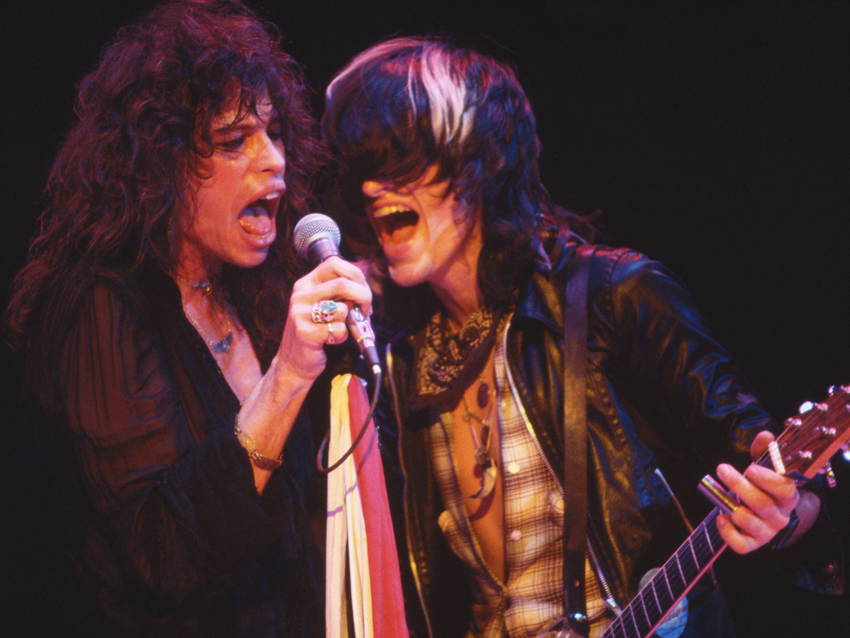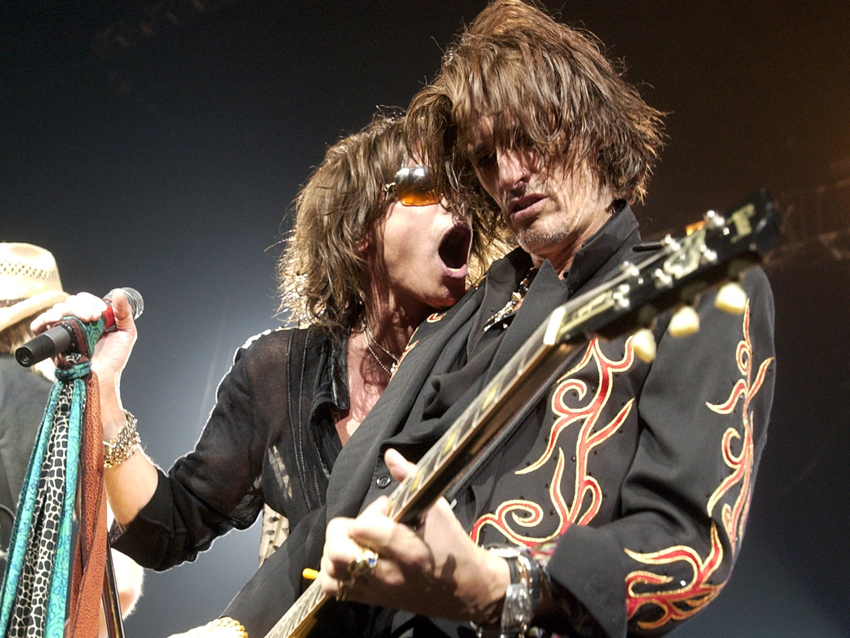
Aerosmith's Joe Perry on his no-holds-barred memoir
“Memoirs are funny things," muses guitarist Joe Perry, whose very own autobiography, Rocks: My Life In And Out Of Aerosmith, will be published by Simon and Schuster today (October 7). "In spite of my learning disability, I’ve always loved to read. I’ve read a lot of autobiographies over the years, but most of them have been written by retired soldiers and people like that. I had it in the back of my mind to do a memoir, but I always thought, ‘Someday… ’ I was too busy doing what I was doing."
Although Perry and Aerosmith haven't slowed their pace, three years ago, with the band's 40th anniversary looming, the guitarist finally sat down to document his life story – and be it manipulative business associates, drugs or his oftentimes rocky relationship with frontman Steven Tyler, no subject is kept at arm's length.
"It was time for me to do this," Perry says. "Some of the other guys had written books, and there was that other book, Walk This Way, which, as entertaining as it might have been, was full with a lot of bullshit. There were a number of other turning points, too – my kids were grown up and were going off. Between everything in my personal and professional life, I felt ready to look at everything."
Working on the book, Perry says that he experienced "a kind of revelation. The only thing I can equate it with are, there are certain colors you remember as a pre-teen, and there’s something that resonates with those colors all through your life. It might seem like a small thing, but it rang true while I was writing the book."
Joe Perry's Rocks: My Life In And Out Of Aerosmith can be ordered at Amazon, Barnes & Noble, BAM, Indie Bound and Audible.com. On the following pages, Perry discusses a few topics covered in his book.

First guitar
Your first guitar was a Silvertone acoustic. I have to imagine that it wasn't the easiest guitar to learn on – not even taking into account how you learned to play it as a righty.
“Oh, it was a struggle to play it. Of course, never having played another guitar at that point, except for trips I would take with my parents to the Sears store, I had no idea how truly hard this one was to play. I remember seeing the guitars at Sears. They had a little section with their own co-branded instruments. Valco made all the Danelectros and Airlines and all of those other guitars – they’ve become extremely collectible.
“However, the Silvertone that I got wouldn’t be high on the collectible list even now. The action was ridiculous, and the strings were like iron. But it was a good guitar to start on because it was trial by fire. If I was gonna stick with it, I would end up with some good, solid calluses.
“That was the guitar I ended up breaking. It was leaning against a wall, and I ran by it one day, just horsing around. I slipped on a rug and knocked the guitar down. It cracked the headstock off, so I put it away in its box for a few months.
“Then The Beatles came out and renewed my interest in music. I had gotten to the point where I was playing stuff that I heard on the radio, but there wasn’t a lot of music that was catching my ear. I had kind of reached a plateau with the guitar. When The Beatles broke and changed my life – changed society, for Christ’s sake – I wanted to get that guitar working again. My dad was pretty handy, and he was able to put it back together. It worked enough for me to realize that I needed something better.”

A very special guitar... and Slash
You write about how you were so broke in 1980 that you had to sell your ’59 Les Paul. I'm curious – how much did you pay for it originally?
“I can’t remember what I paid for it, but I remember what I got for it when I sold it – $3,500. That’s pretty fucking absurd by today’s standards, but back then, in 1980, a dollar was worth a lot more. It got me through Christmas.
“Also, I was playing that mongrel left-handed Strat almost exclusively at that point. When I left Aerosmith, it’s like I took all the guitars I played with that band, except for a couple, like the clear-body Dan Armstrong, and put them aside. I turned that mongrel into the Joe Perry Project guitar.
At one point, you got a call from Eric Johnson, who had the Les Paul.
“I got a call from Eric. He got the guitar and heard that it was mine, so he gave me the opportunity to buy it back. He was going to sell it to me for what he got it for, but I just couldn’t afford it. I didn’t think about it anymore until maybe a couple years later. By then, I had enough money to buy a few guitars, and I thought that the Les Paul would be a great one to try and find. Not long after that, I found out that it was in Slash’s collection.”
The two of you did a back-and-forth thing for a while. He felt bad that you didn’t have the guitar, but he was unsure about selling it back.
“Yeah, it was tough. He had remembered seeing me play it, seeing it on albums and all that stuff, so to actually own it was a big thing for him. Whenever stuff like this happens, I try to put myself in the other person’s position, so I could see where Slash’s need to hold on to the guitar came from.
“It got to be kind of a running joke between the two of us. We had a lawyer in common, friends in common, and they were calling him up going, ‘Slash, you know, you should really sell the guitar back to Joe. Come on.’ And then there would be times when I’d try to call him, but I couldn’t get in touch with him – this was back when he was drinking a lot. I really felt as though it was getting in the way of our friendship, so I sat him down and said, ‘Look, I’m not gonna ask you again. Someday, if you feel like selling it, if you change you mind, great. But I’m not gonna bring it up again – our friendship’s more important.
“A few years went by, and I was having my 50th birthday party. I’m playing on stage, and sure enough, Slash had the guitar brought out to me as a gift. I couldn’t believe it. It was just so symbolic of the kind of guy Slash is. He’s got a really big heart. A great guy.”

Aerosmith's first album
The first album: You didn’t see the cover until after it was printed; Rolling Stone didn’t review it; and your label, Columbia, was putting all its energy into promoting Bruce Springsteen. Who were your champions at Columbia? There must have been some…
“I know that the president of the label at the time [Clive Davis] liked the band. He saw something there, and so did the next president after that [Walter Yetnikoff]. After the record was done, the real heroes were our managers in New York, the Leber and Krebs team. They went in and fought for us and for our second record, in ways that we didn’t even realize till much later. They really went to bat for us.”
It’s interesting that the label was soundly behind Bruce Springsteen at first and not so much Aerosmith – he wouldn’t really start to take off until his third album, Born To Run, two years later.
“Yeah, but as far as the world is concerned, that record is an overnight hit. If you become national, people forget about the years it takes to get there. The Beatles were considered an overnight success, but boy, if you talk to them about their three years in the Hamburg clubs, forget about it. Every month in one of those clubs is worth three times that. And in the music business, every month is like a year.
“The public’s perception of ‘making it’ is so different from what it really is and what it really takes. It was a long road for us, man – playing clubs, just trying to keep body and soul together. I had to buy guitar strings, I had to fix my amp – all those things. It all happened in three years, but God, it seems like 10.”

Steven
Among your many anecdotes about Steven is a recollection of the time that you were trying to write songs for Aerosmith's most recent album, only he was off auditioning for Led Zeppelin – unbeknownst to you. Did you just want to flat-out clobber him?
“Well, of course. [Laughs] But I was starting to get used to it. Even at the beginning, I knew that there was just something about him, that his moral compass was a little different than mine – let’s just put it that way.
“But it wasn’t anything that I didn’t think we couldn’t handle… In kind of old-fashioned terms, they call it ‘the man of different faces.’ The faces that were extremely talented far outweighed, at that point, the arrogant part, the ego part, all that. He kept that pretty much in check at that point. I didn’t realize, over the years, that it would explode over a period of 40 years. It’s nothing that happened overnight; if he were the kind of person that he is now, I never would’ve been able to work with him.
“We all had this vision, this drive, this thing that we wanted to do. That was paramount. It made it pretty easy to get together and work. Back then, bands were always getting together and breaking up, getting together and breaking up. Like my experience with the guys from Block Island – I’d never even heard them play. But just talking to them on the phone was enough to get me on the boat, over to the island with my equipment, to give it a try. That was the time; that’s what it was like. Everybody was young, and we were trying to figure out what we wanted to do with our lives… It just seemed natural to me to run into somebody like Steven. The most important thing was that he was an incredible drummer and he could sing great.”
As you say, bands are always breaking up – and a lot of the time, it comes down to egos. But with Steven, you go into something more than a clash of egos. You paint a picture of him lying to you. That’s hard to deal with in any relationship.
“Well, apparently, my ego is big enough to hold my own. [Laughs] Although I didn’t look at it that way, at that point. I guess it was part of the reason why we were able to stay together.”
Has he read your book?
“No, not yet.”
Joe is a freelance journalist who has, over the past few decades, interviewed hundreds of guitarists for Guitar World, Guitar Player, MusicRadar and Classic Rock. He is also a former editor of Guitar World, contributing writer for Guitar Aficionado and VP of A&R for Island Records. He’s an enthusiastic guitarist, but he’s nowhere near the likes of the people he interviews. Surprisingly, his skills are more suited to the drums. If you need a drummer for your Beatles tribute band, look him up.
